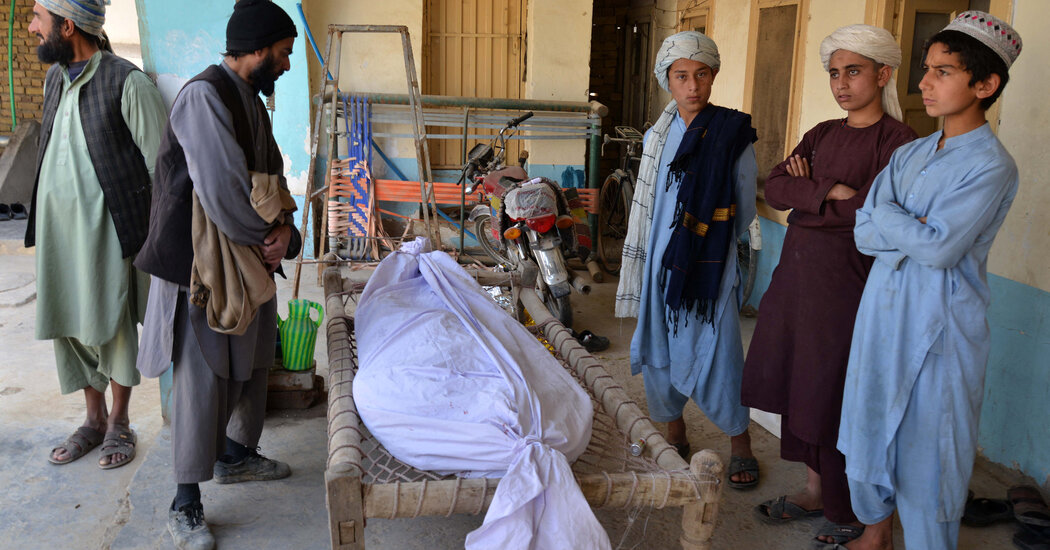A suicide bombing outside a bank in southern Afghanistan on Thursday killed at least 20 people, including several members of the Taliban, according to hospital staff, in a bloody reminder of the terrorist threats that have persisted in the country since the U.S.-led war ended.
The attack occurred about 8:30 a.m., when a bomber detonated explosives in front of a branch of the New Kabul Bank in Kandahar City, the capital of Kandahar Province, according to Taliban officials. The blast appeared to have targeted Taliban members who had gathered at the bank to collect their salaries, witnesses and hospital staff said.
About 50 others were injured, according to a doctor and a nurse at Mirwais Regional Hospital in Kandahar City who insisted on anonymity because they were not authorized to speak to the news media.
Taliban officials, disputing that higher death toll, said that three people had been killed and a dozen others injured in the blast.
No group immediately claimed responsibility for the attack. Taliban officials at the Ministry of Interior said their initial investigations suggested that the Islamic State affiliate in the region — the Islamic State-Khorasan, or ISIS-K — had been behind the blast.
The government “condemns this attack and assures people that the perpetrators of this attack will be identified, arrested and handed over to judicial centers as soon as possible,” according to a statement from the ministry that was published on X.
Kandahar is the birthplace of the Taliban movement and home to the government’s supreme leader, Sheikh Haibatullah Akhundzada. The explosion appeared to send a message that even Taliban soldiers in the group’s heartland were not safe.
While overall security in the country has improved since the U.S.-led war ended in August 2021 and the Taliban seized control, there have been sporadic attacks across Afghanistan, mostly targeting Taliban security forces and the Hazara ethnic minority.
The Islamic State affiliate in the region has claimed responsibility for many of the attacks. Since seizing power, Taliban security forces have carried out a ruthless campaign to eliminate ISIS-K. Last year, the Taliban killed at least eight leaders of the group, according to American officials, and pushed many other ISIS-K fighters into neighboring Pakistan.
But the group, which has been antagonistic toward the Taliban, saying they are not carrying out true Shariah law, continues to pose a threat in Afghanistan. It has also launched large-scale attacks in Pakistan over the past two years, fueling concerns that the region is becoming a hotbed of international terrorism.
Hameedullah Sherzad, 40, said he was asleep in his home next to the bank in Kandahar City on Thursday when his apartment building suddenly shook, waking him. He ran outside and saw the Taliban police rushing to the bank and others loading mangled bodies onto the back of their pickup trucks.
“People were bloodied and lying on the bed of the vehicles,” he said. As more police vehicles arrived, Mr. Sherzad said, he helped carry four bodies and eight other injured people to be taken to the hospital.
Dastagir Wafaiee, 24, a local resident, said he, too, had been awakened by the sound of the explosion. Rushing to the roof of his apartment building, he saw Taliban vehicles racing to the scene.
As the Taliban police loaded the dead and wounded into their vehicles, others collected victims’ clothes and shoes, and swept up shards of broken glass, said Mr. Wafaiee.
A photo from the aftermath of the attack circulating in Taliban WhatsApp groups and viewed by The New York Times shows shattered windows on the second floor of the bank and streaks of blood staining the ground outside the bank’s entrance.
Immediately after the explosion, Taliban officials sought to downplay the severity of the attack and to allay concerns that it represented a security lapse by their intelligence and military forces.
“The wounded people are not in serious condition; they have superficial injuries,” Inamullah Samangani, director of information and culture of Kandahar Province, said in a statement. “The situation is under control.”
Yaqoob Akbary and Safiullah Padshah contributed reporting from Kabul, Afghanistan.




















































